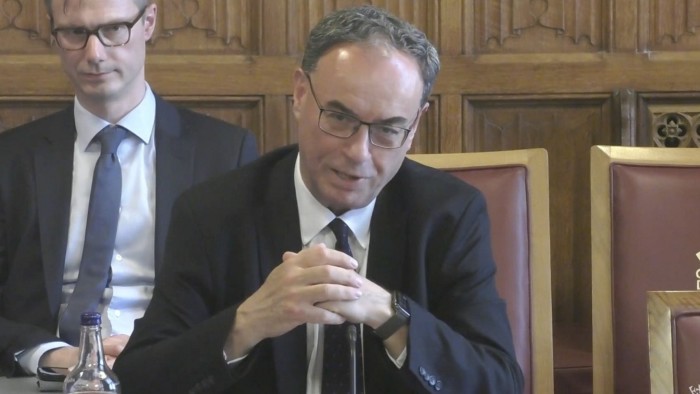Unlock the Editor’s Digest for free
Roula Khalaf, Editor of the FT, selects her favourite stories in this weekly newsletter.
The Bank of England governor has suggested that the UK’s official fiscal forecaster is too optimistic about the prospects for a recovery in productivity growth, questioning an assumption that is critical for the public finances.
Andrew Bailey said the Office for Budget Responsibility had been predicting there would be a recovery in productivity growth after a fall-off following the financial crisis, but that the BoE was “sceptical”.
“If you were to take what I would loosely call the OBR story, I think you would more say it was a financial crisis and that effect will wear off,” Bailey told a House of Lords committee on Tuesday. “I am a bit sceptical about that.”
The governor’s words will add to concerns about forecasts that are a critical factor in the OBR’s outlook for the public finances, given the role of higher productivity in driving higher tax revenues. The OBR in its March outlook warned that an alternative “lower productivity scenario” would lead to the UK government missing its key fiscal target, with the current budget staying in deficit to the end of the decade.
After the financial crisis, the OBR assumed potential productivity growth would rebound to its previous rate. But it has been forced to pare back those estimates as data continues to disappoint, lowering its medium-term productivity growth assumption from about 2.2 per cent to 1.25 per cent.
Its latest outlook remains more positive than the outlook of many other forecasters, sparking speculation that Chancellor Rachel Reeves could be hit by a big OBR downgrade in the autumn, necessitating tax rises or other measures to close the deficit.
“They have a bit more of a reversion of productivity growth to its pre-financial-crisis pattern than we do,” said Bailey at the House of Lords Economic Affairs Committee. The OBR declined to comment.
The governor said it would require major technological developments to drive much higher productivity growth, pointing to artificial intelligence as the most likely candidate.
But he said such innovations took a long time to appear in actual productivity data. “We are all essentially experimenting with AI at the moment,” he added.
Bailey argued that three key “headwinds” were pressuring public finances across a range of advanced economies — the fiscal pressures from an ageing population, the cost of adjusting to climate change, and the end of the post-cold war peace dividend, which is forcing countries to lift defence spending.
He was speaking as leaders prepared to gather for a Nato summit at which President Donald Trump is demanding allies lift defence spending to 5 per cent of GDP.
“I do think it’s important — and I don’t want to sound preachy about this — that we have a proper debate with the public about the implications of all this and what it means for the evolution of the economy and evolution of public debt,” Bailey said.
Anxiety has risen in global bond markets over the sustainability of big economies’ debt burdens, as higher interest rates since the pandemic combine with massive sovereign debt issuance, which is expected to hit a record $17tn across OECD countries this year.
Debt interest costs as a share of economic output are at their highest in decades, and defence spending pledges and other recent fiscal stimulus announcements are expected to add to the pressure.
Bailey questioned the market’s focus on the OBR’s five-year ahead forecast for the current budget, given the fiscal uncertainties that lie ahead. The OBR said in March that Reeves would narrowly meet her key rule for the current budget balance by just under £10bn.
“There is a danger in over-interpreting a five-year forecast,” he said.
The governor added that the BoE would shortly undertake an internal review into plans for reducing its balance sheet via quantitative tightening (QT), ahead a decision on bond sales in September.
Bailey said this would take into account recent reductions in bond prices amid turbulent conditions in global markets.
“It is going to be more interesting this year, because we’ve had quite a steepening of the yield curve,” Bailey said, stressing that this had been seen in all major economies and so it was not driven by QT. “It is a slightly new territory.”



